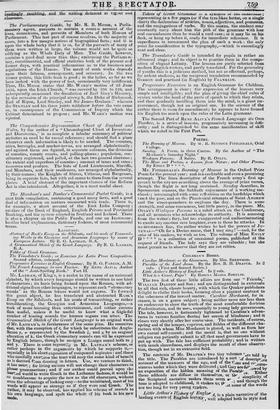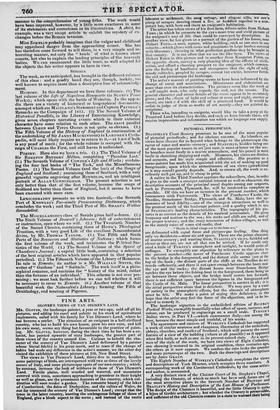CHILDREN'S BOOKS.
Caroline Mordannt; or the Governess. By Mrs. &unworn:). Parables of the Lord Jesus. By the Rev. B. H. DRAEEa. In 2 vols. ( First and Second Series.) Little Arthur's History of England. In 2 vols. What is a Comet, Papa ? By ROSINA MARIA ZORNLIN.
The two first of these little affairs are from our " Friends," WILLIAM DARTON and Son ; and are distinguished in externals by all that rich, chaste beauty, with which the Quaker publishers delight to clothe their books, forming often a piquant contrast to the soberness of the inward matter. Caroline Mordaunt, for in stance, is on a grave subject ; being neither more nor less than an endeavour to show the truth of the most comfortable doctrine Predestination, and its uses, especially to young lady governesses. The tale, however, is fortunately lightened by Caroline's adventures in various families during her season of blindness; and it closes very shortly after her conversion. The incidents, of course, spring out of the temper, caprices, and foibles of the different characters with whom Miss Mordaunt is placed, as well as from her own carnal self-conceit ; and the moral is, that no one without religion can patiently submit to all that most governesses have to put up with. The tale has sufficient probability ; and is written with much shrewdness, and displays the result of close observation, though not in an extensive field.
dreesc told byThe contents of Mr. DRAPER'S two tiny volumes".. the title. The Parables are introduced by a sort ,df account of the manners of the au-e, and of the te and 6 stances under which they were delivered ; and Ciaey are for,owed by an exposition of the hidden meaning of the Poreb),es.'Either these addenda are diffuse in themselves, oe 11), simplicity. of the Scriptural narrative makes thetas seem ee,; and though the tone is adapted to childhood, it strikes tie i1e are too long for very young readers. it some of the words Little Arthur's Hjsiary of Engip leading events of Efiglish hielea. .d, is a plain narrative of the
, well adapted both in style and
manner to the comprehension of young folks. The work would have been improved, however, by a little more exactness in some of its statements and correctness in its illustrations. A shirt, for example, was a very unapt article to exhibit the mystery of exchanges before the Roman invasion.
Miss ZORNLIN probably imagines that the vulgar and childhood may apprehend danger from the approaching comet. She has has therefore come forward to tell them, in a very simple and interesting manner, not only the " heads" of what is known about comets, but also to explain the leading principles of the heavenly bodies. We can recommend the little tract, as well adapted for the objects the fair writer appears to have in view.
SERIALS.
The week, as we anticipated, has brought in the different volumes of this class : and a goodly band they are, though, luckily, too well known to require more than a descriptive line of acknowledgment.
HISTORY. In this department we have three volumes. (1) The last volume of the Life of Napoleon Bonaparte (in Scorfs Prose Works); which opens with the battle of Waterloo. In the appaldix there are a variety of historical or biographical documents; amongst which are MAITLAND'S Statement and Captain PRINGLE'S Remarks on the Campaign of 1815. (2) The Second Volume of Historical Parallels, in the Library of Entertaining Knowledge, gives seven chapters narrating events which in their external character have some relation to each other. The exact parallel between CLEON and TITUS OATES is not quite so obvious. (3.) . The Fifth Volume of the History of England . (a continuation of the undertaking of Sir JAMES MACKINTOSH) in LARDNER'S Cyclepledia, will most likely require us to return to it,—at li ast if bulk is any proof of merit ; for the whole volume is occupied with the reign of CHARLES the First, and still leaves it unfinished.
Powrav. Here also we have a trio. (1.) The Third Volume of Sir EGERTON BRYDGES' Milton, completing "Paradise Lost." (2.) The Seventh Volume of COWPER'S Life and Works; containing the four last books of "The Task," and the Miscellaneous Poems. (3.) The Second Volume (and the last) of the Songs of England and Scotland ; containing those of Scotland, with a very graceful vignette engraving after REYNOLDS, and an intelligent portrait of ALLAN CUNNINGHAM. The present selection is not only better than that of the first volume, because the songs of Scotland are better than those of England, but it seems to have been executed with more care.
LEXICOGRAPHY presents us with two fasciculi,—the Seventh Part of Ktlowmas Fac-simile Pronouncing Dictionary, .which concludes the work ; and the Third Part of Mr. SMART'S Walker Remodelled.
The MISCELLANEOUS class of Serials gives half-a-dozen. (1.) The Sixth Volume of Boswells Johnson ; full of entertainment or instruction, open where we will. (2.) The Twentieth Number of the Sacred Classics, containing three of HOWE'S Theological Treatises, with a very good Life of the excellent Nonconformist divine, by Mr. THOMAS TAYLOR. (3.) The Fifth and Sixth Parts of the Resources and Statistics of Nations ; which forms the first volume of the work, and terminates the Political Statistics of the World. (t) The Second Volume of the Spirit of Chambers's Journal; a capital little book, containing a selection of the best original articles which have appeared in that popular periodical. (5.) The Fifteenth Volume of the Library of Romance. Its tale is Ernesto; its author is a Mr. WILLIAM SMITH, the writer of" Guidone " and "Solitude." The work itself is a philosophical romance, and contains the "history of the mind, rather than the fortunes of an individual." This scheme is not over promising; we must look further before we can tell whether it will be necessary to recur to Ernesto. (6.) Another volume of that beautiful work the Naturalist's Library ; forming the Fifth of Ornithology, and treating of' Pigeons.



























 Previous page
Previous page